The photos shown here are of the hippos in their pool at the Chichindwi weir, where we initially used the sand pump back in May. The photos were taken in early July, one month after we had removed 2500 cubic meters of sand. As you can see there is a large wall of solid sand bearing down upon the hippos’ pool. They rest their heads against this barrier of shifting sand, with the part of the pool that is free from sand just behind them. By early July one quarter of the pool was left for them to submerge in, and sharing the pool with them were three crocodiles. The youngest hippo in the family, Kuchek, a male born in March of 2001, showed his displeasure at this encroaching sand by constantly climbing up onto it. The photos show just how shallow the river is, mere inches in depth, just out of the rapidly shrinking pool. The sand moves relentlessly along, continuously entering the pool and diminishing its size. Kuchek’s light weight made it possible for him to walk on this sand. The larger hippos would sink if they tried to follow his action. Libra, a female of nearly four years of age, protectively raised herself up in the river behind Kuchy as he explored the wall of sand. From the day the hippos moved back into their pool on the 30th May, I spent each day observing their behavior. As the days flew by, the encroaching sand haunted my sleep. I constantly worried about the hippos being left waterless as their home shrunk before my eyes. The Turgwe river had been destroyed by cyclone Eline.
This conservancy now suffered from the onslaught of man’s politics. Poachers roamed the land killing as many of the wild animals as they could, but for money, not for food. Invaders took over land unsuitable for agriculture as an excuse to terrorize the land owners and the workers, to destroy wildlife and the environment. There was burning of the bush, cutting of the trees, total lawlessness. Whilst this situation prevailed, I still spent as many hours as possible observing the Turgwe Hippos. Their lives were not only at stake from being poached and caught in the awful wire snares but their very own home, the Turgwe River, had changed beyond all recognition. I could not remain dispassionate whilst young Kuchy pranced around on the sand that threatened his water home. Nor could I just say to myself “well nature will decide if these animals will survive or die”. Man had already interfered with nature so was it now up to man to try and solve the problems facing these Turgwe Hippos.
For over thirty years, weirs within the TurgweRiver have been home for the hippos during the dry season. In the rain the river ran, but during the dry period this once perennial river became an annual flow, with separate parts. The weirs had created pools, the rocked and cemented wall across the river causing water to be held back as much as one mile in distance, with the depth being the height of the wall- usually around four to five feet. For years the hippos had lived like this, in two groups, a dominant bull in each group: Bob in the one and Happy controlling the other family. For the last eleven years, I had the privilege to watch these hippos, learning daily about their behavior, seeing each new calf grow. During those 11 years we had problems. Initially, there was a drought to beat all droughts.1992 saw the total demise of the TurgweRiver. Yet 13 of the 15 Turgwe Hippos survived, thanks to the generosity of total strangers. I managed to feed them for ten months, and my husband built them a temporary water pan. A cemented structure with walls at the bottom and top of this pan gave them an area to submerge. This stopped any dehydration. We also managed to build a water trough, allowing them to drink clean water. All water pumped from underground boreholes over ten miles away. During that time, some people said to me: “Let them take their chance, if they all die then that is nature’s way, man should not intervene against a natural disaster like a severe drought.” I let these statements take root within my own thoughts but I found myself arguing against such sentiments. We “man” had moved years ago into the hippos’ territories, bringing our cattle. More people moved upstream of the animals- in fact, hundreds upon hundreds of people. These same people used the TurgweRiver, growing their vegetables upon its banks, the water being handier to reach there. Man then dammed the Turgwe for more crops and vegetables to grow over 50 miles away, but even so- a perennial river slowly began to die. Man altered the river’s natural course with his dam, with erosion and gullies that formed, and the habitat slowly changed. So “man” now had decided to form a wildlife conservancy. The people who owned the land looked at it as the most profitable solution for their own businesses. In their case, this business was safaris either for hunting or eco-related and photographic. The future of this area was once more in the hands of man but supposedly for wildlife to have a future as well. In my case, the hippos and my respect for them came from the heart, not from the pocket. They do not belong to me. In fact, our Trust- the Turgwe Hippo Trust- is non-profit. It is there purely for their future, for the hippos to have a chance at safety in their wild habitat, and to hopefully improve their conditions when needed through the building of back up pans for droughts, and more weirs to hold pools in a dying river. Sure, nature has now given us a new problem: the cyclone destroyed three of the four weirs, the river is full of sand. But the sand is not just from nature and the immense flooding that occurred. The sand comes from exposed areas covered in the flooding water during that period, also from the weir upstream that broke when its accumulated amount of sand was washed down. The eroded banks brought even more sand and now, for the first time in thirty years, the Turgwe river is more sand than water. But what of the future of these hippos?
The members of this conservancy hope to continue to run a wildlife-related industry, so the future of the animals is supposedly okay. The land invasions and the poaching should eventually stop, but what about the immediate future for these wild animals? Here at Hippo Haven, what is happening is depressing to say the least, for myself and Jean-Roger. Each day brings new problems but we refuse to give up or to run from the difficulties. We try to meet them face on. So the Trust has bought its very own sand pump and, as I type, my husband is once more back in the pool. But this time he is alone. We chose a more user-friendly machine, having it made to our own specifications, wanting something far more manageable which does not need lots of workers, a tractor, nor large machinery to off load and maneuver. After initial teething problems, we are on top now. The pumping of the pool began on July 28th-two days after the hippos left the tiny part of water that remained in their pool. All the hippos are now back living in the bushes that form an island between the pool and the other channel of the TurgweRiver. Since I worry about the hippos being caught in wire snares, I tried to approach them in this dense bush to discover if I could see their bodies clearly, but to no avail. That first trip through the maze of hippo tunnels which twist and turn in the thick riverine bush caused my heart to beat too loudly, my mouth to become dry. It is a dangerous situation to be in, for any self-respecting hippo would feel challenged by the sudden appearance of a human in this temporary refuge from their normal water home. Even I, who all the hippos have known, would never be tolerated and rightly so. After all, they are completely wild animals, never touched by a human hand. Even though they know my voice, I would be nothing less than totally irresponsible and stupid to think that I could approach them in this maze and believe they would not hinder me. A hippo’s normal reaction to predation, be it by a lion or from man, is to escape into the nearest spot of deep water. Sadly, at this moment, there is nowhere for the hippos to take refuge. So if they are cornered in this tight, dark evergreen world they would have but one reaction: to charge and attack, if they cannot run away. On my first attempt, Jean-Roger was behind me and suddenly he saw me frantically signal to return to the tunnel we had just left. Ahead of me I had spotted young Libra lying asleep, fortunately we had not disturbed her rest. From that day on, I just had to hope all hippos were in one piece, without a snare attached to any parts of their bodies. As Jean has worked the pool each day, he removes quite a large amount of sand- approximately 120 cubic meters. But sadly around 25 cubic meters makes its slow progress back into the area he clears. This is very demoralizing, but what can we do? Miles and miles of sand cover the river upstream of the pool. We hope that Jean-Roger will have cleared the pool by 17th August and that the hippos will quickly return once we have removed the sand pump, the pipes, and all traces of man’s machinery. Then, if we are lucky, the pool may last through until October. If we do not get early rains, then Jean will have to do the work all over again. Once the rains come, the pool will totally fill with sand at the return of a stronger current. But by then the channels in the Turgwe will have better areas for the hippos to utilize. For the first time in my eleven years of studying the hippos, they will have no pool to utilize during the rainy season. We cannot pump sand out when the river is higher and the current stronger. We were hoping to fix the one broken weir, called the measuring weir, but we do not have enough money to do this by October. The cost is approximately US$1500 to fix it, but all of the Trust’s monies have gone towards the payment for this sand pump and added expenses to sort out teething problems. If we could fix this weir, although it too is full of sand, it has a much longer pool that is held by its wall. The one area would remain deep enough during the rains for the hippos to live in,and by the time the dry weather returns we would be able to clear the Chichindwi weir again. This would give us two areas for the hippos to utilize. At present, I am videotaping all work that the Trust has carried out to date, as well as the sand pump operation. I will show each individual hippo and name him or her on the video, so that any foster parent who wishes to see their own hippo can buy the Trust’s video tape. I will also include interesting behavioral traits of the hippos and a talk about the Trust. We hope it will be available for sale by Christmas. This production will be edited and put together by professionals called Mwana and Nelda. The Turgwe Hippo Trust would like to thank all the people who have helped us to date to reach the stage we are at, at this moment in time, with the sand pump and the removal of sand from this pool. Firstly, a very big thank-you to ENVIRONMENT 2000, especially Charley Hewitt and Howard Voss, who kindly approached Swift Transport. And thanks to the reputation of Environment 2000, Swift kindly donated free transport of the sand pump from Harare to Chiredzi- a 350 mile journey. A big thank-you to Andrew and Barbara Gibson of Gibcon for building the pump at such short notice. Thank you to Hilton Booysen of Booysen Irrigation for coming all the way down to the lowveld to sort out teething problems; to Mrs. Stuifbergen of Holland for her donation which helps us to pay some of the cost for this pump; to our friend, the lady who wishes to remain anonymous, whose initial donation has helped us to pay for the hire of the pump and now to pay for this one. Without people’s help these hippos would have died back in the 1992 drought. We are now in 2001 and things are better in some ways and more difficult in others. But the people who have helped to date are still caring for these animals and we- the operators on the ground- are deeply indebted to anybody who can help us help the hippos.
As a footnote :
yesterday, 13th August, Jean-Roger was nearly finishing up for the evening, at approximately 4.20pm when his attention was caught by a noise. He turns around and finds a hippo just about to enter the pool only twenty feet from where he was working. Jean stood up in shock and fortunately this movement caused the hippo to take note of this strange thing in the pool dressed in a black wet suit. The hippo did an about-turn and headed back into the bushes. Jean-Roger came up to the house to get me but by the time I got back down there the hippo was gone. Checking the spoor I would say it was either one of the youngsters, Libra or Odile, but big enough to give one a fright. She must have had quite a shock seeing a man in her pool but I hope later that night she took advantage of the pool, and that soon all of them will be able to get back in and enjoy the security of their home for another couple of months. Poor Jean-Roger has a very stiff back from daily bending and removing mountains of hippo dung that tries its hardest to clog up the suction pump! Never a dull moment in Africa!!!!!!!
P/S August 18th- 18 hippos moved back into their pool last night. All are fine, thank goodness. This means we have had to stop the work which we intended to finish on Sunday night, so that is not so bad. We are letting them settle in now and tomorrow will try to remove the pipes and the pump without causing them too much disturbance. Another crocodile has also joined the one that was there when Jean worked in the pool yesterday. So we believe between the crocodiles and the hippos we are being told that our services are no longer required for now. Hopefully, we will get early rains and not need to pump the pool again in October but I will keep you all posted. It is too wonderful to see 18 hippos back in their home especially since it has suddenly got extremely hot in the last few days and they all need to keep submerged. Jean has a very, very sore back but watching the hippos has made the pain worthwhile. They do not have as deep an area as before, as their defecation had caused a large amount of hard soil, sand and dung to accumulate, making it hard for Jean to go down as deep, but they all can submerge. Young Kuchek moved in front of me to about fifteen feet this morning, as if to say thanks. I wish you all could see the hippos back in their pool.
Karen and Jean-Roger Paolillo, August 2001.

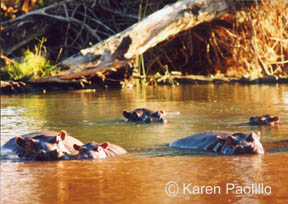
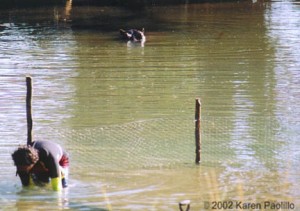
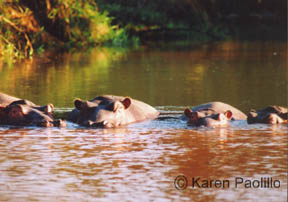
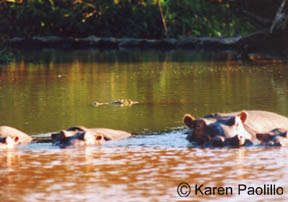
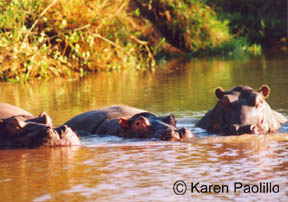
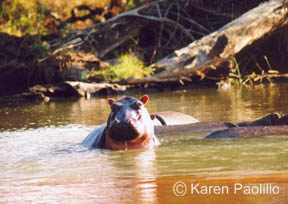
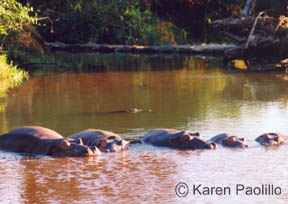

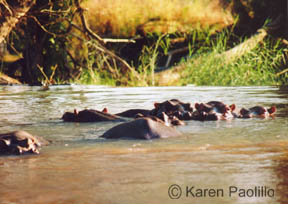
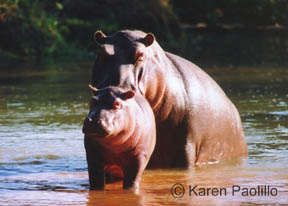
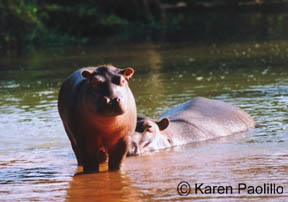

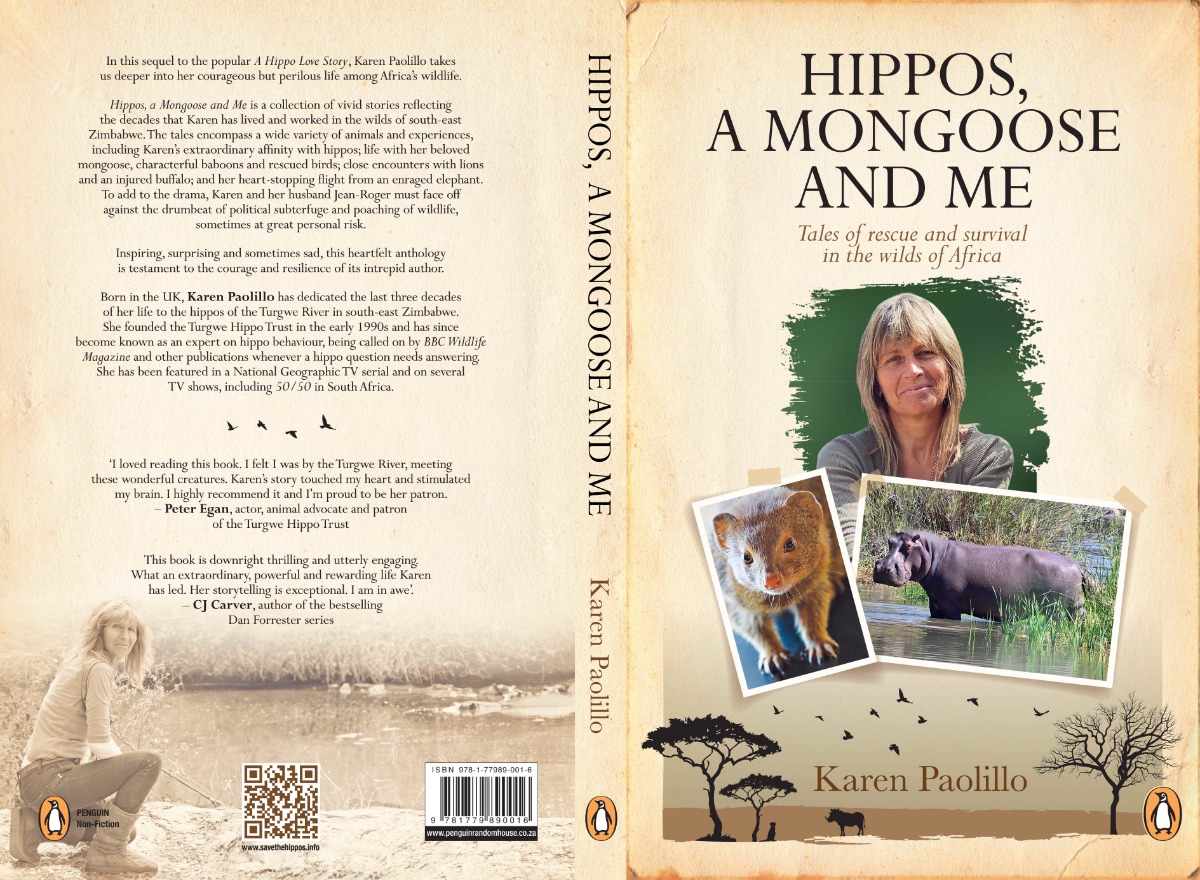
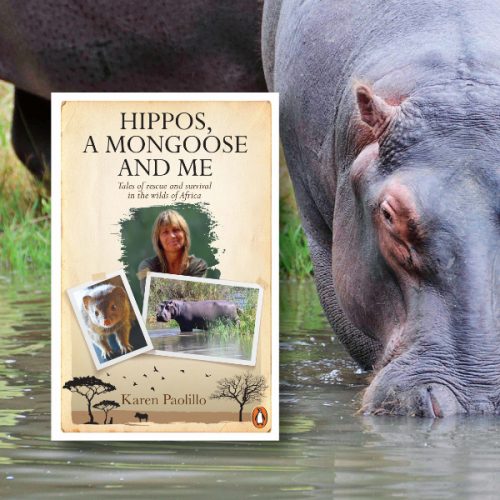
0 Comments